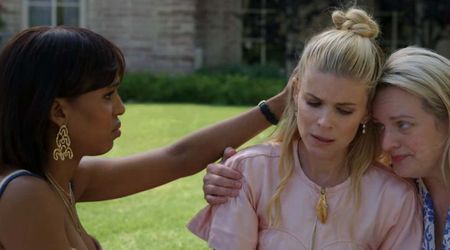'The Goop Lab' Episode 1: Paltrow's employees make anecdotal cases for mental health benefits of magic shrooms

“The following series is designed to entertain and inform -- not to provide medical advice. You should always consult your doctor when it comes to your personal health, or before you start any treatment.” Netflix’s documentary series ‘The Goop Lab’ about Gwyneth Paltrow’s wellness brand comes with a warning that has a more covering-one’s-butt feel than a serious warning. But that sounds reasonable when you remember that a couple of years ago Goop settled a $145,000 lawsuit over unfounded medical claims attached to some of its products, like the “Jade and Rose Quartz eggs” -- egg-shaped stones designed to be inserted vaginally and left in for various lengths of time -- that claimed could balance hormones, regulate menstrual cycles, prevent uterine prolapse, and increase bladder control.
The first episode, titled ‘The Healing Trip’ deals with psychedelics -- specifically psilocybin and MDMA. With anecdotal experiences from what the show refers to as case studies, we are given life-affirming examples of how psychedelics have helped people with depression, suicidal tendencies, and health anxieties. So far, so good, right?
But it’s not just outsiders who have been highlighted for the benefit of the unwashed masses to learn about “wellness”. It’s the Goop employees themselves who are at the forefront of this battle, risking their bodies to sell us an idea that there really is something ethereal that Gwyneth Paltrow’s brand has to offer.
As Gwyneth talks to “experts” appointed by the show -- this is not a comment on the experts’ qualifications and credentials, rather a mistrust for the Goop brand and its sensibilities in general -- one of her employees shares about her trip to Jamaica with work colleagues where they tried psilocybin (magic mushrooms) and had a cathartic experience.
The setting was that of psychotherapy, but really it just looked like a bunch of hippies decided to chill at a beach shack on yoga mats and have mushroom tea to get blazed. The experiences of the Goop employees looked unbelievably artificial and the whole affair had an air of rich cult members sharing mysticism with new initiates. Which is really as a good metaphor for Goop as can be.
The real kicker of the episode, however, is near the end. The “expert” on the show says, “Maybe we can do a Goop MDMA-assisted therapy clinic,” to which Elise Loehnen, Goop’s chief content officer, says, “Yeah, it’s happening,” and Gwyneth responds, “Sounds like a Christmas party.” The pristine and ultramodern office of Goop fades out as they all laugh in affirmation.
At that moment, one realizes that ‘The Goop Lab’ is hardly a documentary series. It is an extremely well-produced infomercial. It’s not these “pioneers” of wellness exploring the unexplored to make the world better. It’s just a brand trying to sell you $90 multivitamins called “WHY AM I SO EFFING TIRED?” or a $495 vibrator called “VFIT INTIMATE WELLNESS SOLUTION”.
The only fitting emotion one can muster up after watching ‘The Goop Lab’ is the shrug emoji. The show is available for streaming on Netflix.










